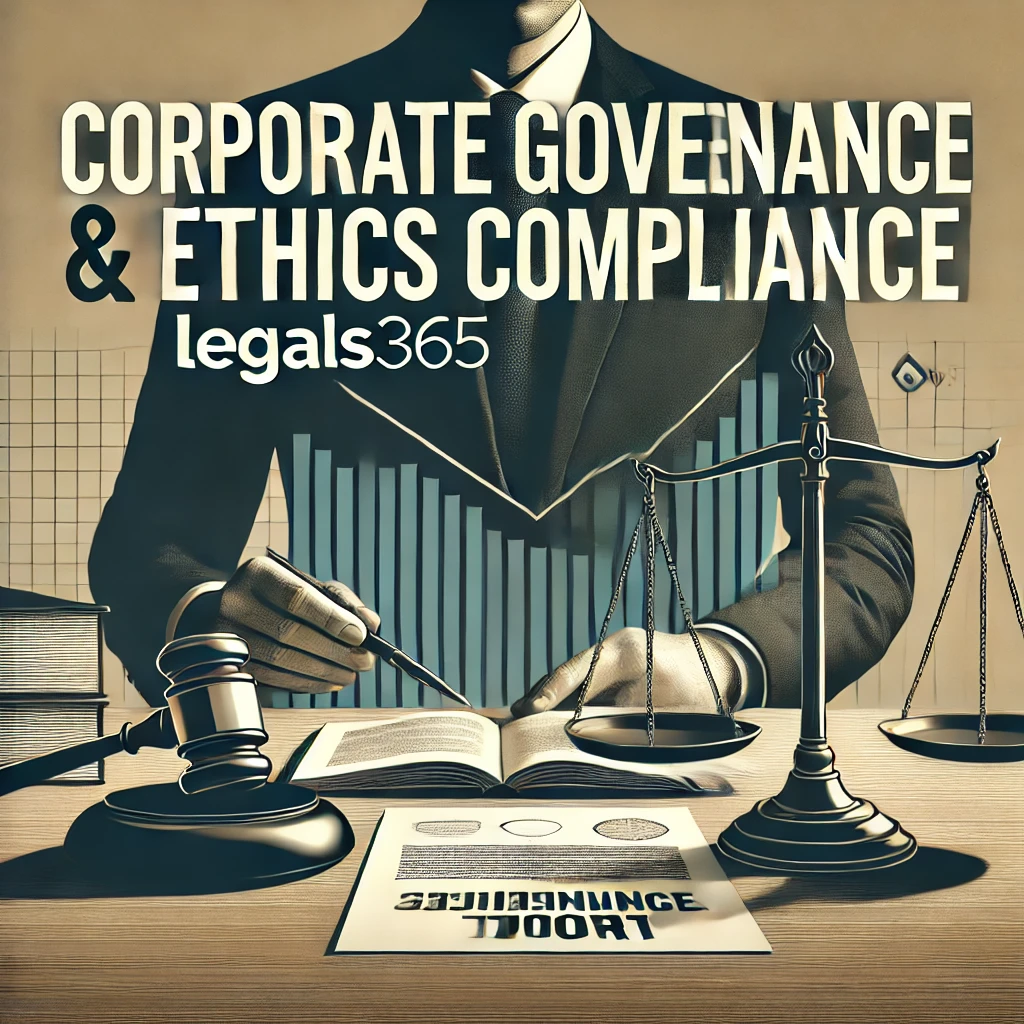
Corporate Governance & Ethics Compliance: A Guide for Businesses
Introduction
Corporate governance and ethics compliance are essential for businesses striving to build credibility, trust, and sustainability. Companies that adhere to strong governance frameworks and ethical standards gain a competitive edge, attract investors, and avoid legal pitfalls. Failing to comply with governance laws and ethical guidelines can lead to legal action, reputational damage, and financial losses.
At Legals365, we help businesses develop and implement corporate governance structures that ensure accountability, transparency, and legal compliance. This guide explores the importance of corporate governance and ethics compliance, key principles, and how businesses can strengthen their governance frameworks.
Understanding Corporate Governance & Ethics Compliance
What is Corporate Governance?
Corporate governance refers to the system of rules, practices, and processes by which a company is directed and controlled. It ensures that organizations operate efficiently, ethically, and in compliance with legal standards.
What is Ethics Compliance?
Ethics compliance involves adhering to moral and legal standards in business operations. It ensures that businesses operate with integrity, honesty, and accountability in all dealings.
Why Corporate Governance & Ethics Compliance Matter
- Enhances Business Reputation – Builds trust among investors, customers, and stakeholders.
- Ensures Legal Compliance – Reduces the risk of legal penalties and lawsuits.
- Improves Risk Management – Helps businesses identify and mitigate potential risks.
- Boosts Investor Confidence – Well-governed companies attract investors and funding.
- Promotes Ethical Business Practices – Prevents fraud, corruption, and unethical behavior.
- Strengthens Internal Controls – Establishes accountability and transparency.
Key Principles of Corporate Governance
1. Accountability
- Ensures decision-makers are responsible for company performance.
- Defines roles of directors, executives, and stakeholders.
2. Transparency
- Provides clear financial and operational reporting.
- Ensures open communication with stakeholders.
3. Fairness
- Protects minority shareholders and stakeholders.
- Prevents conflicts of interest and ensures equitable treatment.
4. Responsibility
- Encourages ethical leadership and corporate social responsibility (CSR).
- Implements sustainable business practices.
5. Compliance with Laws & Regulations
- Ensures businesses follow industry regulations.
- Implements internal audits and compliance programs.
Key Components of an Effective Governance Framework
1. Board of Directors & Leadership
- Defines board responsibilities and structure.
- Establishes independent committees for audit and risk management.
2. Corporate Policies & Code of Conduct
- Implements policies on ethics, anti-corruption, and conflict of interest.
- Establishes whistleblower policies to report unethical behavior.
3. Risk Management & Internal Controls
- Develops frameworks to identify, assess, and manage risks.
- Ensures compliance with financial reporting standards.
4. Ethical Business Practices & CSR
- Promotes sustainability and responsible business conduct.
- Implements fair labor practices and environmental policies.
5. Regulatory Compliance & Legal Adherence
- Ensures compliance with corporate laws and industry regulations.
- Conducts regular compliance audits.
Common Challenges in Corporate Governance & Ethics Compliance
- Lack of Transparency – Inadequate disclosure of financial and operational matters.
- Boardroom Conflicts – Disagreements over strategic direction.
- Fraud & Corruption Risks – Weak internal controls leading to unethical practices.
- Regulatory Non-Compliance – Failing to meet legal requirements.
- Weak Risk Management – Poor identification and handling of business risks.
How Legals365 Can Help with Corporate Governance & Ethics Compliance
At Legals365, we provide expert legal advisory services to ensure businesses meet corporate governance and ethics compliance standards. Our services include:
- Governance Policy Development – Creating governance structures aligned with industry best practices.
- Regulatory Compliance Audits – Conducting legal reviews to ensure compliance with corporate laws.
- Risk Assessment & Management – Identifying governance risks and implementing mitigation strategies.
- Code of Ethics & Business Conduct – Developing corporate policies to promote ethical behavior.
- Board Training & Leadership Advisory – Guiding board members on legal responsibilities.
- Whistleblower Policy Implementation – Ensuring protection for employees reporting unethical practices.
- Anti-Fraud & Anti-Corruption Compliance – Establishing robust fraud detection measures.
Conclusion
Corporate governance and ethics compliance are essential for business success, investor confidence, and legal protection. Companies that adhere to governance best practices reduce legal risks, foster ethical leadership, and build long-term sustainability.
At Legals365 and Online Noida, we provide businesses with expert corporate governance and compliance advisory services to ensure legal, ethical, and operational excellence. Contact us today to strengthen your governance framework and build a more resilient business.
Hashtags:
#CorporateGovernance #EthicsCompliance #BusinessEthics #CorporateLaw #LegalCompliance #RiskManagement #CorporateTransparency #GovernancePolicies #RegulatoryCompliance #Legals365 #OnlineNoida
